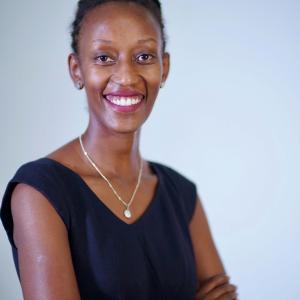Falling pregnant at the age of seventeen, Gisele Umutoni found herself at a crossroads between having to solely raise her first child as a single teen mother, and taking the time to explore multiple avenues to generate income to sustain herself and her now two children.
“When I got pregnant, I really did not know what to do with myself. I had no source of income or technical skills that I could use to find a job.” Gisele reflected.
Fortunately for Gisele and many other vulnerable women in the country, UN Women fostered partnership with the Young Women Christian Association (YWCA) to reach more vulnerable women in the country, including teen mothers, sex workers, and women living with disabilities, with the intention of equipping them with actionable entrepreneurship skills to strengthen their potential to participate in safe and profitable income generating activities.
“When I was approached by YWCA and UN Women to receive the training, I immediately accepted knowing that this would be a valuable opportunity to shift my fortunes towards a better future for myself and my children.” She added.
Over the course of several months, Gisele, along with over 500 vulnerable women in Rwanda, determinedly took part in a comprehensive training curriculum entailing financial literacy, entrepreneurship, business management, and more, paving way for them to transform their lives towards a more positive socio-economic trajectory.
Upon completion of the initial training courses, YWCA opened opportunities for some of the participants to take part in additional TVET courses including mechanics, tailoring, and other fields. When Gisele heard about this, she immediately took the opportunity to pursue mechanics, despite it being a male dominated field. Three months after completing the mechanics course, Gisele delved into the sector in an effort to break the common stereotypes that have hindered women from effectively participating and thriving within the field.
“Pursuing mechanics sparked my passion, and I was sure I would dedicate my career to it after graduation. Shortly after the course, I was approached by a friend who was already a mechanic to work with him on various jobs. This period was truly enriching as it enhanced my skills to tackle many of the real-world scenarios beyond what we were taught in the trainings. Through this partnership, we were able to make a significant amount of money that we could evenly split. At this point I felt a major relief because as a single mother, I was finally able to meet my family`s basic needs, and even afford to take my children to school.” added Gisele.
Now after all expenses, Gisele can make a saving of approximately fifteen Dollars ($15) per week. Her expertise is now recognized outside of her direct environment, enabling her to travel to different districts to provide expert mechanical services. For her, this is only the beginning towards fulfilling much larger ambitions to strengthen the socio-economic position of her family.
“My current goal is to expand my expertise which will improve my wellbeing both socially and economically. I hope to eventually open my very own garage, equipped with quality equipment, to provide the very best of mechanic services. Achieving this would truly make me happy and would be of great value to my family. I wish to also serve as a role model to many young women and encourage them to not be afraid to take on male-dominated roles like mechanics because it is possible.
I wish to also thank UN Women and its partners for the support that they have provided to me. It is because of their dedication to empowering women that I am in this position today. I am truly grateful.” concluded Gisele.
This UN Women intervention contributes to the UN Rwanda Joint Programme on Gender (implemented by UN Women, UNDP, UNFPA, UNHCR, UNICEF, IOM, and OHCHR). Funded by the Swiss Agency for Development and Cooperation (SDC), the programme aims to support the Government of Rwanda in comprehensively addressing gender-based violence by addressing social norms and negative mindsets and creating avenues to reduce the economic vulnerability of women and girls.



